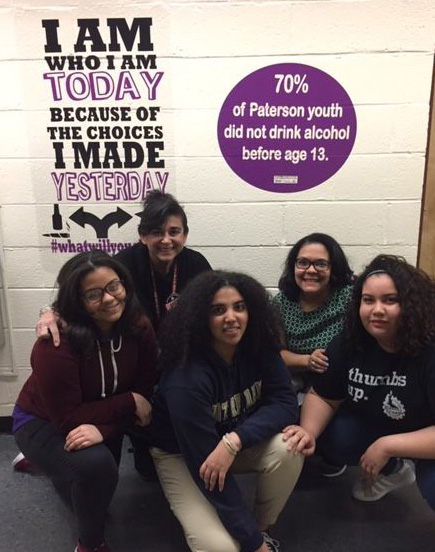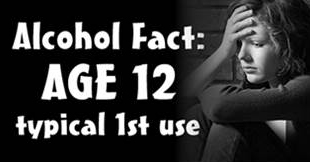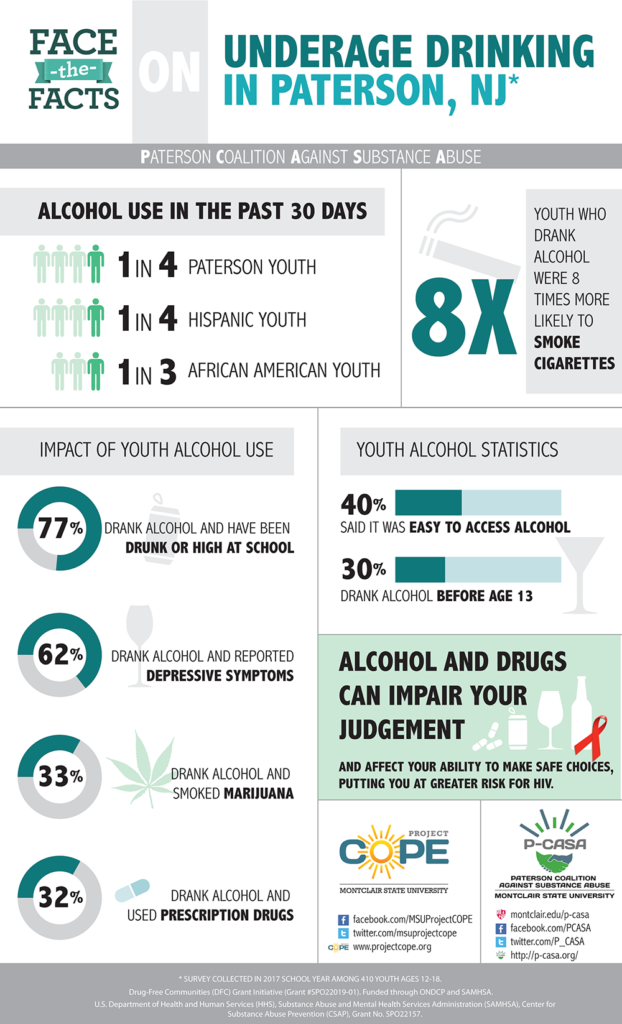Alcohol
The Negative Impact Of Underage Drinking On Paterson’s Youth… And What We Can Do To Stop It
WHAT WOULD YOU DO if you found out that 30% of Paterson kids under age 13 have already started drinking alcohol? WHAT IF YOU KNEW that 25% of our city’s high school students admitted to drinking alcohol at least once in the past 30 days? HOW WOULD YOU REACT to finding out that 77% of Paterson youth who admitted to drinking alcohol also admit to being drunk or high at school?
The statistics—though alarming—are a real picture of our city, according to a recent study from the Paterson Coalition Against Substance Abuse (P-CASA).
 Paterson kids need your help.
Paterson kids need your help.
“Even though the P-CASA study shows that Paterson youth are drinking too much, too young, we firmly believe there are steps we can take to turn things around,” says Dr. Robert J. Reid.
One of the first steps is obvious—make it harder for our youth to access alcohol. According to New Jersey state laws, Paterson should have about 70 alcohol outlets based on the city’s population. Today, there are 197 places to buy alcohol in Paterson. Paterson’s 1st Ward, the primary area targeted by P-CASA, has approximately 50 alcohol outlets in just over one square mile.
“It’s no wonder Paterson youth say it’s easy to get their hands on alcohol,” says P-CASA Coalition Member.
P-CASA is working to build a better Paterson.
Since 2011, P-CASA has worked with and within the Paterson community to eliminate underage drinking, tobacco, and substance use—and to reduce the negative outcomes of these behaviors.
 Most recently, the Coalition partnered with City Council officials to draft an ordinance that prohibits the sale of hard liquor, beer and wine after 10 p.m. The Coalition is also working with the Mayor’s office and City Council to develop policies and ordinances that limit the number of new alcohol selling establishments and decrease the number of existing outlets that may be in violation with existing city ordinances.
Most recently, the Coalition partnered with City Council officials to draft an ordinance that prohibits the sale of hard liquor, beer and wine after 10 p.m. The Coalition is also working with the Mayor’s office and City Council to develop policies and ordinances that limit the number of new alcohol selling establishments and decrease the number of existing outlets that may be in violation with existing city ordinances.
The Coalition also supports other important measures:
- Private Property Ordinance–Permits municipalities to enact ordinances prohibiting minors from possessing or consuming alcoholic beverages on private property; provides for fines and license suspensions for violations; exempts possession or consumption in connection with a religious ceremony, employment at a licensed establishment, or in the presence and with the permission of a parent, guardian, or relative.
- Conduct GIS mapping to identify areas of alcohol establishments and reduce their impact.
- Establish relationships with local servers and sellers of alcohol and work together to learn the latest trends in false ID’s and learning the legal and social consequences of serving alcohol to underage youth.
- Developing social media marketing and education campaigns that inform and educate the community on the impact of underage drinking, tobacco, and substance use.
- Develop a Checklist of Indicators for the enforcement of policies and local ordinances regarding the sale of alcohol products.
Alcohol use among youth can damage their mental and physical health
During adolescence, significant changes occur in the body and the brain. The brain is not fully developed until about 25 years old. Alcohol and illicit drug use can have negative effects on adolescent development.
Unfortunately, most adolescents and parents aren’t aware of the true effects of alcohol on the teen brain and how it impacts brain health.
To find out more on this important topic, read this article.
There are many ways to get involved
P-CASA understands that we can accomplish much more by working together with the wonderful people of Paterson. If you or your organization want to help build a safer and healthier Paterson for our youth, join us as we work to eliminate underage drinking, tobacco, and substance use:
- Attend P-CASA meetings
- Participate in a P-CASA subcommittee or working group
- Provide access to survey participants
- Help distribute prevention messages and materials
- Advocate for policies and ordinances that align with P-CASA’s goals and mission
- Provide insight and solutions to community concerns
- Represent P-CASA at community events and meetings
- Recruit community members to join and participate as P-CASA members

